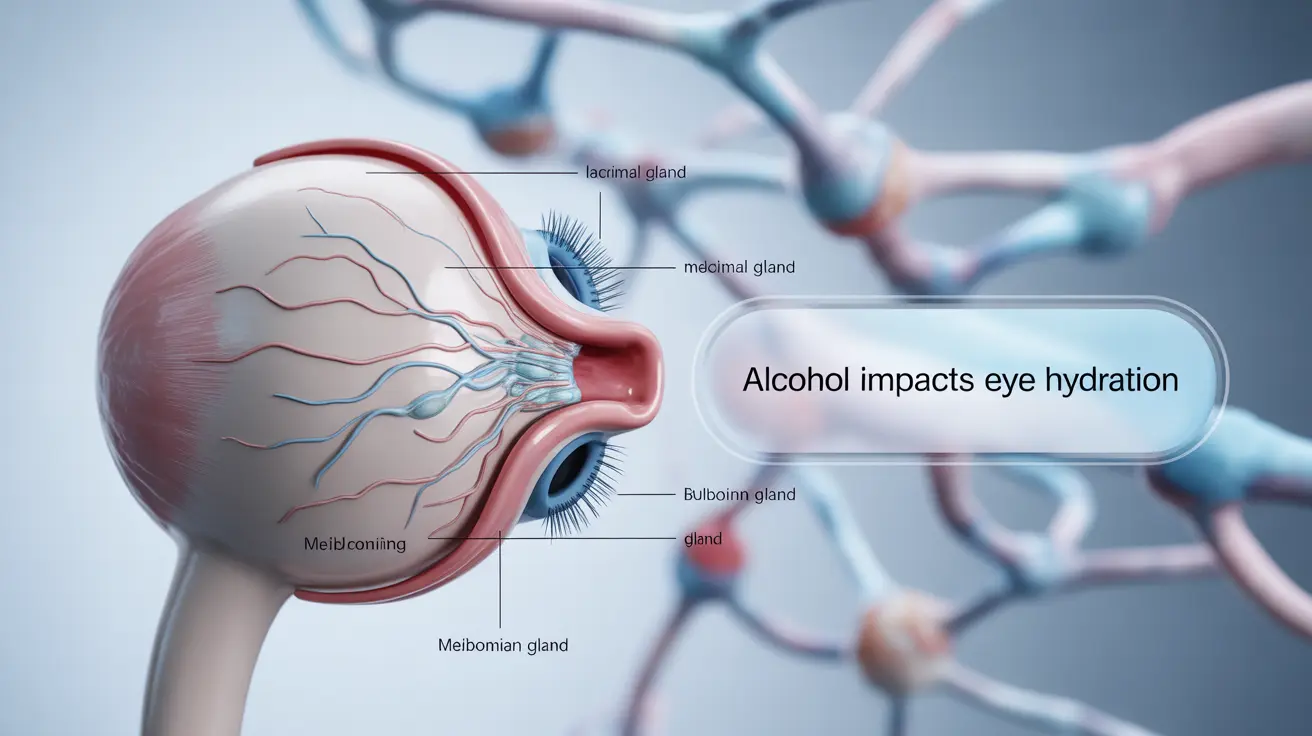The relationship between alcohol consumption and eye health is more significant than many people realize. Drinking alcohol can have a direct impact on your eyes, particularly when it comes to dry eye symptoms. Understanding this connection is crucial for maintaining optimal eye health and making informed decisions about alcohol consumption.
While occasional drinking might seem harmless, regular alcohol consumption can contribute to or worsen dry eye symptoms, affecting both your eye comfort and vision quality. Let's explore the various ways alcohol impacts your eyes and what you can do to protect your eye health.
How Alcohol Affects Your Eyes
Alcohol acts as a diuretic, causing increased fluid loss throughout your body, including your eyes. This dehydrating effect can significantly reduce tear production and quality, leading to uncomfortable dry eye symptoms. Additionally, alcohol can interfere with your body's natural tear film stability, which is essential for maintaining proper eye lubrication.
The impact becomes more pronounced with regular or heavy drinking, as alcohol can affect the function of the meibomian glands - tiny oil-producing glands in your eyelids that help prevent tear evaporation. When these glands don't function properly, your tears evaporate too quickly, leading to chronic dry eye issues.
Gender Differences in Alcohol-Related Dry Eyes
Women often experience more severe dry eye symptoms related to alcohol consumption compared to men. This increased susceptibility is largely due to hormonal differences and variations in how alcohol is metabolized in the female body. Women typically have less water content in their bodies and different enzyme levels that process alcohol, making them more vulnerable to alcohol's dehydrating effects.
The Vitamin A Connection
Alcohol consumption can significantly impact your body's vitamin A levels, which is crucial for eye health. Regular drinking can interfere with vitamin A absorption and storage in the liver, potentially leading to deficiency over time. Vitamin A is essential for:
- Maintaining healthy tear production
- Supporting proper corneal function
- Protecting against night blindness
- Preserving overall eye health
Prevention and Management Strategies
Taking proactive steps to protect your eyes while drinking alcohol can help minimize dry eye symptoms:
- Stay well-hydrated by drinking water between alcoholic beverages
- Limit alcohol consumption to moderate levels
- Use artificial tears when needed
- Maintain a balanced diet rich in vitamin A
- Consider taking breaks from alcohol to allow your eyes to recover
Frequently Asked Questions
How does drinking alcohol cause or worsen dry eyes?
Alcohol causes dry eyes primarily through its dehydrating effects as a diuretic. It reduces tear production, disrupts tear film quality, and can impair the function of oil-producing meibomian glands in your eyelids, all of which contribute to dry eye symptoms.
What are the common symptoms of dry eye related to alcohol consumption?
Common symptoms include burning or stinging sensations, feeling like there's something in your eye, blurred vision, increased sensitivity to light, and general eye discomfort. These symptoms often become more noticeable the morning after drinking.
Why are women more at risk of alcohol-induced dry eye than men?
Women are more susceptible due to their body composition (lower water content), different hormone levels, and varying enzyme concentrations that process alcohol. These factors make women more vulnerable to alcohol's dehydrating effects on the eyes.
Can reducing alcohol intake help improve or prevent dry eye symptoms?
Yes, reducing alcohol consumption can significantly improve dry eye symptoms. Many people notice improvements within days of decreasing their alcohol intake, especially when combined with proper hydration and eye care practices.
How does alcohol affect vitamin A and why is that important for eye health?
Alcohol interferes with vitamin A absorption and storage in the liver. Vitamin A is crucial for tear production, corneal health, and overall vision. Reduced vitamin A levels due to alcohol consumption can compromise these important eye functions and worsen dry eye symptoms.




